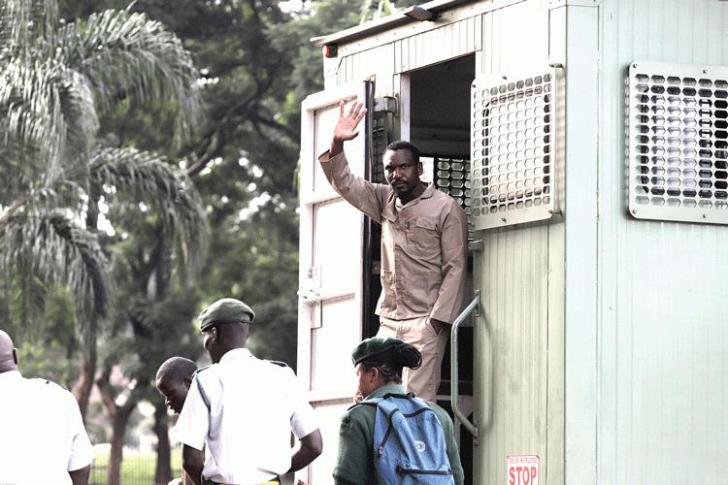Opinion / Columnist
Blessed Mhlanga's Fury Exposes Zimbabwe's Broken Justice
09 May 2025 at 11:03hrs |
0 Views

The fenced gate of Harare Central Remand Prison swung open on Wednesday night, releasing Alpha Media journalist Blessed Mhlanga after 73 days of pre-trial detention. But the man who emerged was not the same one who entered. Watching Mhlanga's press interview following his release, one could not help but be struck by the rage of anger radiating from him. It was not a theatrical rage, but a deep-seated fury, etched onto his face and resonating in his voice, the raw emotion of a man who felt profoundly wronged.
Mhlanga's crime? Airing a press conference by a war veteran, Blessed Geza, who dared to challenge President Emmerson Mnangagwa. For this, he was charged for transmitting data inciting violence, a charge that many see as a thinly veiled attempt to silence dissenting voices. The absurdity of the accusation, coupled with the agonisingly slow wheels of justice, fuelled a simmering resentment that finally boiled over in his post-release interview.
His words, though measured, dripped with disdain for a system that could unjustly rob a man of his freedom for over two months. He spoke of the hellish conditions within the prison walls, the lack of resources and the personal toll the experience had taken on his health. But beyond the physical hardships, it was the injustice of it all that seemed to haunt him the most.
Mhlanga's case is a painful reminder of the often-cruel reality of the Zimbabwean justice system, a system where political affiliations can outweigh the principles of fairness and due process. It evokes memories of a past where those in power wielded the law as a weapon against their rivals, a past that many hoped had been left behind.
Indeed, Mhlanga's ordeal brings to mind the story of President Mnangagwa himself, who was once forced to flee the country after Robert Mugabe threatened to imprison him. The irony is stark, a leader who once experienced the sting of political persecution now presides over a system where similar injustices continue to occur.
The question that lingers is, what has changed? Is the future of those in power truly secure when the very institutions meant to uphold justice are perceived as instruments of oppression? In this age of instant information and widespread connectivity, the actions of those in authority are subject to unprecedented scrutiny. The masses are no longer passive observers, they are active participants in shaping the narrative.
Mhlanga's anger is not just his own, it is a reflection of the frustration and disillusionment felt by many Zimbabweans who yearn for a truly just and equitable society. His case is a warning that the abuse of power, even in the digital age, will not go unnoticed. The echoes of his anger will continue to reverberate, demanding accountability and a fundamental shift in the way justice is administered in Zimbabwe. The world is watching, and the future of those in power may well depend on their willingness to listen.
One day only one day justice will prevail.
Engineer Jacob Kudzayi Mutisi
Mhlanga's crime? Airing a press conference by a war veteran, Blessed Geza, who dared to challenge President Emmerson Mnangagwa. For this, he was charged for transmitting data inciting violence, a charge that many see as a thinly veiled attempt to silence dissenting voices. The absurdity of the accusation, coupled with the agonisingly slow wheels of justice, fuelled a simmering resentment that finally boiled over in his post-release interview.
His words, though measured, dripped with disdain for a system that could unjustly rob a man of his freedom for over two months. He spoke of the hellish conditions within the prison walls, the lack of resources and the personal toll the experience had taken on his health. But beyond the physical hardships, it was the injustice of it all that seemed to haunt him the most.
Mhlanga's case is a painful reminder of the often-cruel reality of the Zimbabwean justice system, a system where political affiliations can outweigh the principles of fairness and due process. It evokes memories of a past where those in power wielded the law as a weapon against their rivals, a past that many hoped had been left behind.
Indeed, Mhlanga's ordeal brings to mind the story of President Mnangagwa himself, who was once forced to flee the country after Robert Mugabe threatened to imprison him. The irony is stark, a leader who once experienced the sting of political persecution now presides over a system where similar injustices continue to occur.
The question that lingers is, what has changed? Is the future of those in power truly secure when the very institutions meant to uphold justice are perceived as instruments of oppression? In this age of instant information and widespread connectivity, the actions of those in authority are subject to unprecedented scrutiny. The masses are no longer passive observers, they are active participants in shaping the narrative.
Mhlanga's anger is not just his own, it is a reflection of the frustration and disillusionment felt by many Zimbabweans who yearn for a truly just and equitable society. His case is a warning that the abuse of power, even in the digital age, will not go unnoticed. The echoes of his anger will continue to reverberate, demanding accountability and a fundamental shift in the way justice is administered in Zimbabwe. The world is watching, and the future of those in power may well depend on their willingness to listen.
One day only one day justice will prevail.
Engineer Jacob Kudzayi Mutisi
Source - Engineer Jacob Kudzayi Mutisi
All articles and letters published on Bulawayo24 have been independently written by members of Bulawayo24's community. The views of users published on Bulawayo24 are therefore their own and do not necessarily represent the views of Bulawayo24. Bulawayo24 editors also reserve the right to edit or delete any and all comments received.
Join the discussion
Loading comments…














































